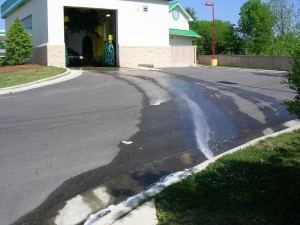An environmental issue of concern that is often associated with car wash companies is that of wastewater discharge. As a car wash professional, you are responsible not just for keeping your customers’ vehicles clean but also for the resultant by-products generated in the process.
Here are some effects of inadequate wasterwater discharge
When cars are washed, the discharged water will contain grease, chemicals, toxic oils, suspended solids and other pollutants. And, unless controlled or treated at source, a lot of these non-desirable substances will one way or another, wind up in the streams, rivers, lakes, and land, which may be frequented by you, your family and your local community. You may well be fishing in those spots and eating fish that has ingested some of these discarded toxic substances.
Apart from harming the fish, the survival of other aquatic life will also be under threat. Oftentimes, the phosphorous and nitrogen found in many commercial detergents increases the water’s nutrient levels which then stimulates the overgrowth of weeds and algae. In turn, this reduces the oxygen levels in the water, needed by pre-existing aquatic life. As a result, their micro ecosystem may disappear altogether.
Advice and help with wastewater discharge regulations
Given the severity of the “downstream” effects of wastewater discharge, rules, guidelines and best management practices fact sheets are available from state and local offices of the Environmental Protection Agency (EPA), Occupational Safety & Hazard Administration (OSHA) and Water Department, to help car wash company owners contain and minimize this issue.
For instance, the Best Management Practices Manual produced by Washington State’s Ecology Department provides in great detail, a few reasonable options as to what can be done with vehicle and equipment washwater discharges. Their recommendations include the zero discharge system, the use of water recycling systems, or discharge to a municipal wastewater system.
Where the zero discharge option is concerned, chemicals may be used to remove solids from the wastewater. They advise operators on how to safely and effectively handle and dispose of the resultant chemical sludge in order not to pollute the local large water systems. If you are not keen on using chemicals, there are organic options that involve the use of selected bacteria colonies that will literally eat up the soaps, oils, grease and waxes in the wastewater and then die.
If car wash companies discharge their wastewater directly or indirectly into a surface water body, a wastewater discharge permit such as the National Pollutant Discharge Elimination System (NPDES) permit is required. If the wastewater is discharged directly to a sanitary sewer system, a state construction permit and a state operating permit may both be needed before the business owner can proceed to do so.
The extent to which car wash water must be handled and treated before release to the environment have to fall in line with local rules and regulations that are aligned with The Clean Water Act. The various wastewater discharge standards and wastewater discharge limits that apply in your locality is readily available.
So, to avoid any run ins with the said authorities, it is in your business best interests to contact your closest EPA, OSHA, Water Department or Department of Ecology for the relevant permits, rules, regulations and best practices that apply to car wash companies.
Better yet, check the DetailXPerts Franchise Opportunity
As our franchisee, you benefit from our industry knowledge and business expertise, including wastewater discharge procedures.
Enjoyed this post? Sign up for our newsletter to receive more valuable business and franchise info, ideas, and extras!





